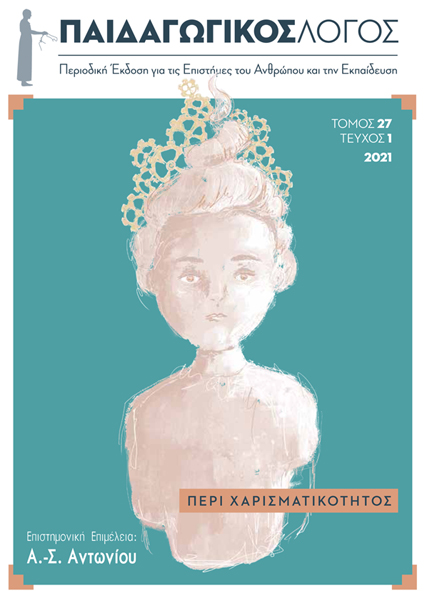Εκπαιδευτικές στρατηγικές σε χαρισματικά παιδιά: Mια συγκριτική μελέτη σε Αυστραλία, Ουγγαρία, Ρωσία και Ελλάδα
Abstract
Οι ειδικοί επιστήμονες, οι εκπαιδευτικοί και οι γονείς των χαρισματικών παιδιών στην Ελλάδα προβληματίζονται έντονα σχετικά με τις μεθόδους εκπαίδευσης των χαρισματικών μαθητών. Στόχος του παρόντος κεφαλαίου είναι να παρουσιαστούν συγκριτικά οι εκπαιδευτικές στρατηγικές που ακολουθούνται σε Αυστραλία, Ρωσία, Ουγγαρία και Ελλάδα. Με αυτόν τον τρόπο, θα διερευνηθούν τρόποι εκπαίδευσης των χαρισματικών παιδιών σε χώρες με μεγάλη παράδοση στο συγκεκριμένο ζήτημα, με απώτερο σκοπό να εξεταστούν οι προοπτικές ανάπτυξης αυτών των στρατηγικών στην χώρα μας. Η Ουγγαρία ήδη από το 1980 έχει μεριμνήσει για τους χαρισματικούς μαθητές, μέσω του δημόσιου εκπαιδευτικού της συστήματος. Η Ρωσία είναι μια χώρα που πάνω από μισό αιώνα υποστηρίζει προγράμματα ενίσχυσης των χαρισματικών μαθητών, ειδικότερα στις θετικές επιστήμες, ενώ η Αυστραλία είναι πρωτοπόρος χώρα στις εκπαιδευτικές στρατηγικές των χαρισματικών παιδιών. Τέλος, στην Ελλάδα γίνονται διάφορες προσπάθειες τόσο για την αξιολόγηση όσο και για την εκπαίδευση των χαρισματικών παιδιών, οι οποίες όμως είναι ακόμα σε πρώιμο στάδιο και στηρίζονται κατά κύριο λόγο σε ιδιωτικές πρωτοβουλίες.
Article Details
- Zitationsvorschlag
-
Παππά Μ., & Αντωνίου Α.-Σ. (2021). Εκπαιδευτικές στρατηγικές σε χαρισματικά παιδιά: Mια συγκριτική μελέτη σε Αυστραλία, Ουγγαρία, Ρωσία και Ελλάδα. Παιδαγωγικός Λόγος, 27(1), 83–100. https://doi.org/10.12681/plogos.27917
- Rubrik
- Articles

Dieses Werk steht unter der Lizenz Creative Commons Namensnennung - Nicht-kommerziell - Keine Bearbeitungen 4.0 International.
Οι Συγγραφείς που δημοσιεύουν εργασίες τους σε αυτό το περιοδικό συμφωνούν στους παρακάτω όρους:
- Οι Συγγραφείς διατηρούν τα Πνευματικά Δικαιώματα και χορηγούν στο περιοδικό το δικαίωμα της πρώτης δημοσίευσης, ενώ ταυτόχρονα τα πνευματικά δικαιώματα της εργασίας προστατεύονται σύμφωνα με την χρήση άδειας που υιοθετεί ο «Παιδαγωγικός Λόγος - Περιοδική Έκδοση για τις Επιστήμες του Ανθρώπου και την Εκπαίδευση» : Αναφορά Δημιουργού – Μη Εμπορική Χρήση – Όχι Παράγωγα Έργα 4.0 (CC BY-NC-ND). Αυτή η άδεια επιτρέπει στους άλλους να έχουν πρόσβαση στο έργο και να το μοιράζονται με άλλους, εφόσον κάνουν αναφορά σε αυτό, ωστόσο δεν μπορούν να το αλλάξουν με κανένα τρόπο ούτε να το χρησιμοποιούν για εμπορική χρήση.
- Οι συγγραφείς μπορούν να συνάπτουν ξεχωριστές και πρόσθετες συμβάσεις και συμφωνίες για τη μη αποκλειστική διανομή της εργασίας, όπως δημοσιεύτηκε στο περιοδικό αυτό (π.χ. κατάθεση σε ένα ακαδημαϊκό καταθετήριο ή δημοσίευση σε ένα βιβλίο), με την προϋπόθεση της αναγνώρισης και την αναφοράς της πρώτης δημοσίευσης σε αυτό το περιοδικό.
- Το περιοδικό επιτρέπει και ενθαρρύνει τους συγγραφείς να καταθέτουν τις εργασίες τους μέσω διαδικτύου (π.χ. σε ένα ακαδημαϊκό καταθετήριο ή στους προσωπικές τους ιστοσελίδες) πριν και μετά από τις διαδικασίες της δημοσίευσης, καθώς αυτό μπορεί να οδηγήσει σε παραγωγική ανταλλαγή ιδεών και σκέψεων, καθώς επίσης και σε γρηγορότερη και μεγαλύτερη χρήση και ευρετηρίαση της δημοσιευμένης εργασίας



